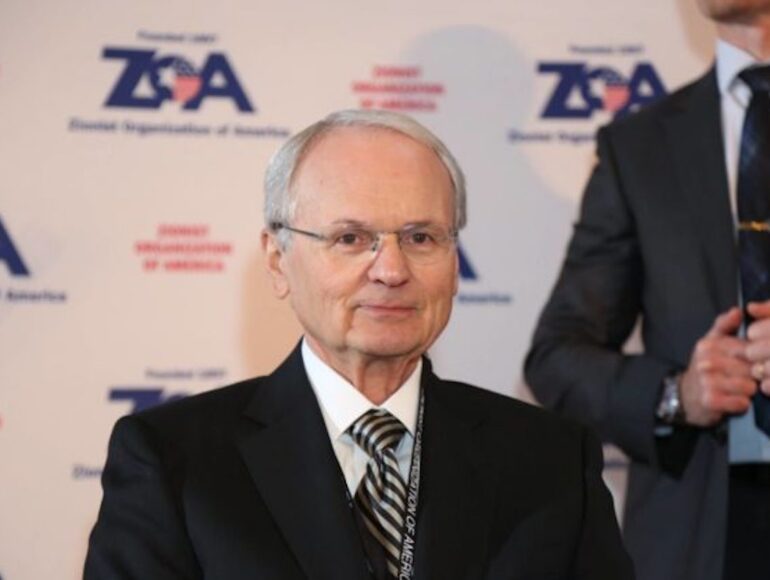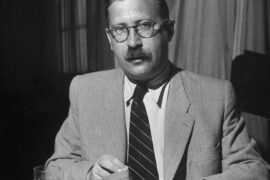The Zionist Organization of America (ZOA) slammed StandWithUs (SWU) this week for repeating what it described as an “extremely harmful” and “serious falsehood” that the State of Israel officially supports a two-state solution and is open to the notion of a Palestinian state in Israel’s disputed heartland.
ZOA and SWU are two of the most prominent pro-Israel advocacy organizations in the United States and it’s unclear whether this episode is an attempt by ZOA to distinguish itself in the hasbara community or merely a small part of the larger growing rift amongst US Jews when it comes to Israel-related issues.
Although SWU functions within a right-wing ideological paradigm that promotes an Amerocentric view of the Middle East and justifies oppressive structures on the basis of security, the organization for the most part avoids taking positions on internal Israeli issues.
On Sunday, however, the ZOA attacked SWU for writing that “Israel does not oppose the notion of an independent Palestinian state, and officially supports the two-state solution.”
The passage came in the context of a sample letter which, the ZOA said, SWU had composed for its supporters to send to the Columbian embassy and consulate, in order to oppose Columbia’s recent official recognition of a sovereign Palestinian state.
In a statement released by ZOA President Morton Klein and Chairman Mark Levinson on Monday, the organization said that it was “dismayed” to see that “Instead of correcting this serious error after being notified, StandWithUs is now ignoring the truth and is doubling down and is repeating this erroneous claim in a new StandWithUs website post that Israeli policy supports a Palestinian state.”
Since US President George H.W. Bush interfered in Israel’s political system to oust Prime Minister Yitzḥak Shamir (Likud) from office in 1992, most Israeli governments have at the very least feigned acceptance of Washington’s two-state agenda for the country.
Even Prime Minister Binyamin Netanyahu (Likud), who during his first term in office attempted to resist the country’s division and was subsequently removed in 1999 by political operatives dispatched by Washington, officially endorsed America’s partition plan at his 2009 Bar-Ilan speech.
But since the 2015 formation of Netanyahu’s current government, Israeli cabinet ministers and lawmakers have increasingly disavowed the two-state model for resolving Israel’s conflict with the Palestinians.
The ZOA leaders said SWU had failed to take notice of a series of recent statements by Netanyahu, Israel’s ruling Likud party and government officials, indicating, in the ZOA’s words and emphasis, that “CURRENT Israeli policy OPPOSES a Palestinian state, yet StandWithUs cites old abandoned Israeli statements.”
“By contrast and disingenuously, StandWithUs merely linked to old, no-longer-relevant, abandoned statements, made by Netanyahu under fear of, and extraordinary pressure and threats by, the hostile-to-Israel Obama administration,” the statement read.
SWU responded to the ZOA’s criticism with a statement issued on Tuesday, which read in part that “While prospects for an agreement have dimmed in recent years, Israel has not announced a change to its official policy of supporting two states for two peoples under agreed upon conditions. Furthermore, a majority of the Israeli public has historically supported two states. While that support dipped to 43% in a poll released this week, Israelis still prefer this solution over others by a wide margin.”
“We recognize that this is an issue of controversy and debate in Israeli society, and as a non-partisan education organization StandWithUs does not take a position on it,” the organization said, adding that “Our role is to simply state the facts. We will continue to fulfill that educational mission, without regard to pressure from any side of the political spectrum.”
ZOA’s criticism of SWU and opposition to a two-state solution would be more impressive had it come from an ideological commitment to the Jewish homeland rather than from security concerns and the offensive notion that Palestinians aren’t “ready” for statehood. So long as ZOA refuses to reject partition on principle, there will be little difference between it and SWU other than the fact that the latter believes it good for Israel’s image to be perceived as accepting of Washington’s agenda to divide the land.
While both organizations are largely ignorant of Palestinian issues and aim to present Israel as the “good guy” in what seems to be a G-rated pro-Israel fantasy of the conflict, the ZOA – despite its public embrace of unsavory characters like Steve Bannon and President Donald Trump – should be commended for actually taking clear political positions on major Israeli issues.
Resisting the partition of our homeland is an important struggle long abandoned by America’s mainstream pro-Israel community, most likely for fear of drawing attention to a clear conflict between Israeli and US interests. But such resistance must stem from a deep loyalty to our homeland and must include realistic alternative solutions that seriously address not only Jewish aspirations but also what’s important to most Palestinians.





